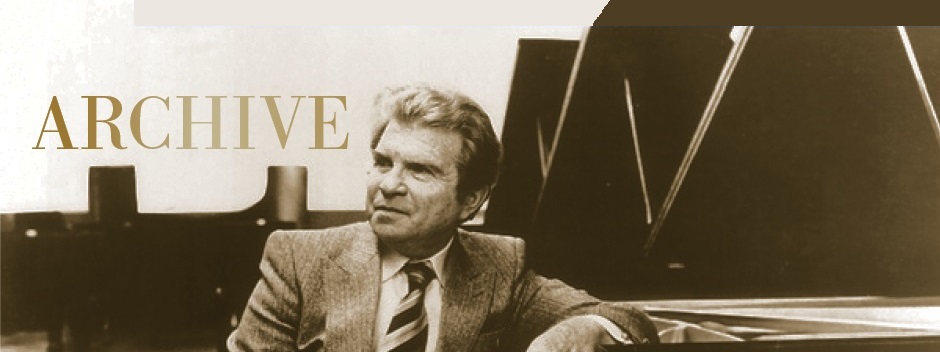When the war broke out Gilels was not evacuated with the conservatory. Instead he joined the civilian resistance and following an order for his return, he began to perform on the Front and in hospitals. At the start of 1943 he performed Stravinsky’s bravura piece Petrushka to the weary inhabitants of besieged Leningrad.
In the same period Gilels started to regularly perform works by Rachmaninov and Prokofiev. Rachmaninov’s Third Piano Concerto in D minor Opus 30 and his Preludes firmly established themselves in his repertoire. As a result of Gilels’ brilliant interpretations of Prokofiev’s works, including among them his Toccata, the Second and Third Piano Sonatas, the composer requested Gilels to present to the public his recently composed masterpiece – the Eighth Piano Sonata in B flat Opus 84. Gilels triumphantly played this work in the Grand Hall of the Moscow Conservatory on the 30th December 1944. Likewise he distinguished himself in Prokofiev’s Third Piano Concerto in C major Opus 26.
The war years opened a new chapter in the relationship between Gilels and Neuhaus. In November 1941 Heinrich Neuhaus was arrested and taken to Lubyanka and his demise was both imminent and certain. Here however Gilels changed the course of fate. Gilels had, from time to time, the opportunity of meeting Stalin (Stalin would invite Gilels to play for government and diplomatic events): after the performances Stalin would invariably ask Gilels whether he was in need of anything. Gilels would always turn down this offer, but on this occasion he asked the Leader to spare Neuhaus. Stalin was irritated but nevertheless granted the request. Neuhaus was sent into exile and it was through the further efforts of Gilels, along with a few other students of Neuhaus (namely B. Marantz and S. Benditzky), that he was allowed to remain in Sverdlovsk and granted the right to teach in the conservatory there. Gilels regularly visited Neuhaus in Sverdlovsk and played four-hand arrangements with him – in this way compensating for the lack of communication with the great musician during his student years.
When the war ended Gilels was to undertake a special mission. He was to represent the Art of a victorious country. He took to the stage amongst the ruins of Eastern Europe, and soon after the war he went on concert tours of Italy, the United Kingdom, France, Austria, Scandinavia and numerous other countries. Gilels was facing unfavourable circumstances – a Soviet pianist, a ‘symbol of Socialism’, was greeted with apprehension. However, when he left the stage it was always to a storm of ovations: people jumped from their seats, rushed to the stage and demanded encores. It was the same wherever Gilels happened to perform: regardless of the situation his playing always carried the inherent qualities of a genius and he literally conquered Europe. Every European country considered it a great privilege to invite Gilels to perform or record. He was decorated with medals and honours – the public worshiped him.


